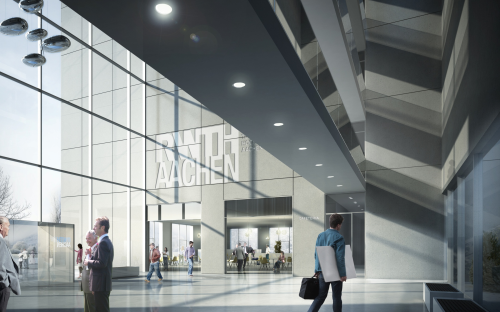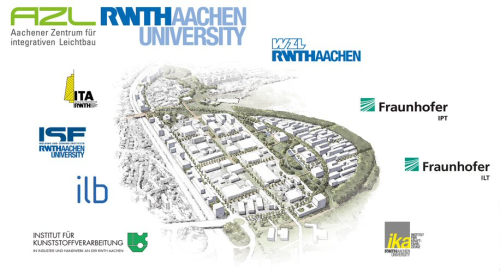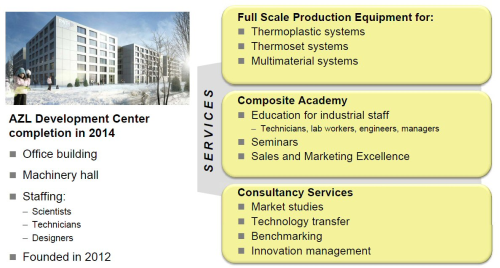


|
RWTH Aachen is one of the biggest technical universities in Europe. It’s home to around 38,000 students, with more than 10,000 of these studying in the Faculty of Mechanical Engineering.
Under the framework of the German government’s Excellence Initiative, which aims to promote top-level research and make Germany a more attractive research location, new ‘clusters’ will be established at RWTH Aachen during the next 10 years. In total, 19 new research institutes will be set up on an area of 800,000 m2.
AZL will be one of the first to be set up on this new campus. Part of the Faculty of Mechanical Engineering, it will open its doors in the summer of 2014.
Centre of the network
On the existing RWTH Aachen campus there is already an established network of eight institutes and more than 700 scientists focusing on areas related to lightweight composites design and production (including textiles, plastics, joining, production technologies, lightweight design and automotive engineering).
As Dr Michael Emonts, CEO of AZL, explains, there is also a strong focus on bringing industry together with university scientists on the RWTH Aachen campus, and the institutes work in cooperation with industrial partners from along the supply chain, including moulders, material suppliers, Tier 1 suppliers and OEMs from different industries.
“We have major companies who have development centres in Aachen, to have a close collaboration with the scientists, and also to have contact to the students in Aachen,” Emonts reports.
For around 25 years these institutes have been working together in projects involving lightweight materials and production technologies, so why is AZL needed? Emonts explains.
| This network of competence in lightweight production at one single location is unique. |
| Dr Michael Emonts, CEO of AZL |
“It’s because of the challenges from different industries. It’s always a problem with composites to switch over to mass production. We have, in Aachen, for many decades, these collaborations and strong connections with the industry, but these are single processes, and single topics. What we are doing now at the AZL is developing process chains, to realise the new mass production technologies.”
“So we already have the complete value chain of composites available, and AZL is the centre,” Emonts notes. “This network of competence in lightweight production at one single location is unique.”
With an area of 25,000 m2 the new AZL building complex will have office space, a machinery hall (housing equipment for thermoplastic, thermoset and multi-materials systems) and there will infrastructure for 800 scientists. A ‘city’ will also be built up around the centre, with hotels, restaurants, shops and services to cater for industrial partners.
The exact amount of funding the German government is putting into this project has not been disclosed. Companies are also contributing to the cost through office rentals, but the institutes are expected to finance themselves.
Services
The AZL will offer three main services.
First of all, there is industrial collaboration. Companies will come to AZL for help with solving a problem and a development research project will be set up.
Secondly, a ‘Composites Academy’ will be established. Companies will be able to send their employees to the academy for further education. It will also offer seminars on various topics.
“With the background of the current shortage of experts and the need for restructuring industrial companies in the future with the introduction of new materials, this Composites Academy will provide essential services, which complete the unique one-stop-shop offer of the AZL,” explains Emonts.
The Composites Academy is expected to start operations in 2015.
The third service will be consultancy. One project, a marketing and technology study, has already started. Its aim is to evaluate the technical feasibility for mass production of new applications for lightweight materials. The study, which started in March, is focusing on five market segments: transportation; oil, water, gas; building and construction; renewable energy; and consumer, sports and leisure. AZL’s 33 founding partners, which include materials and equipment providers and composites manufacturers, as well as Siemens, Johnson Controls, Opel and Toyota, are supporting this initial project.
|
AZL is designed to address the need for an integrated, automated approach to composites production suitable for high-wage countries, as Dr Michael Effing, CEO of consulting company AMAC and AZL’s senior advisor, explains. “For me, having worked in 20 years in this area, I see a couple of very important trends. The first trend, specifically after the crisis of 2008, was the very labour-intensive activities in making composite parts (wind turbine blades etc.) move to Asia, to India and China. Wind blades are coming now from China and India to Europe, because labour costs are much cheaper there, and this industry will not come back. The industry that is really going to be strong in Europe is the automated industry, where you can do mass production and cycle times of a few minutes or seconds, and that will stay, and the concept is really that we try to work on these requirements.” “Everybody understands the requirement for lightweight, and less impact on the carbon footprint, but really what we need to bring is also mass production, and mass production specifically in automotive. We are very happy that BMW and others are bringing composites to the market. The BMW i3 and i8 are presented at the Frankfurt show in September this year. It’s all composite production. It’s RTM at the moment, but there’ll be other areas in the future where we have to produce 50,000, 100,000 cars per year in new technologies. This is what we try to focus on. We try really a new fundamental approach to integrate all the elements along the value chain, so the know-how from thermoplastics, from thermosets, the fibres etc., the tool designs, the robotics, the machinery, and at the end of the day, it’s ideally fully-automated, with as little labour content as possible, but high quality and consistent quality.” “This is what we try to do with the new AZL, and I think the AZL will have a very good future to show mass production capabilities for composites that will stay in Europe, in North America, in high labour countries.” |
“The unique aspect of this study is that new markets for composites are being identified which are not yet accessible for these materials,” reports Dr. Kai Fischer, Divisional Director Composite Production Technology of AZL. “The study therefore provides an ideal basis for the development of new strategic business areas for the participating companies all along the value chain.”
In summer 2014, the AZL will open its doors with the results of the 12-month long study. The findings will be shared exclusively with the study partners (who pay a participation fee), but the applications identified in the project will be developed further through the AZL.
“Lightweight materials pay a key role for Siemens,” says Mike Fodden, of Siemens AG. “We are developing automation solutions for fibre composites process technologies and therefore, the cooperation with AZL brings us unique entry, both from the market side as well as from the technology side.” ♦
This article was be published in the July/August 2013 issue of Reinforced Plastics magazine.
The digital edition of Reinforced Plastics is distributed free of charge to readers who meet our qualifying criteria. You can apply to receive your free copy by completing the registration form.




